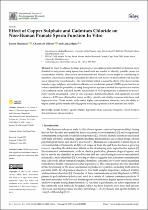| dc.description.abstract | Abstract: In order to address the large percentage of unexplained male infertility in humans, more detailed investigations using sperm functional tests are needed to identify possible causes for compromised fertility. Since many environmental and lifestyle factors might be contributing to infertility, future studies aiming to elucidate the effect of such factors on male fertility will need the use of appropriate research models. The current study aimed to assess the effects of two heavy metals, namely copper sulphate, and cadmium chloride, on non-human primate (NHP) sperm function in order to establish the possibility of using these primate species as models for reproductive studies. Our combined results indicated that the functionality of NHP spermatozoa is inhibited by the two Citation: Hardneck, F.; de Villiers, C.; Maree, L. Effect of Copper Sulphate and CadmiumChloride on Non-HumanPrimate Sperm Function In Vitro. Int. J. Environ. Res. Public Health 2021, 18, 6200. https:// doi.org/10.3390/ijerph18126200 Academic Editor: Mei-Fang Chien Received: 9 April 2021 Accepted: 21 May 2021 Published: 8 June 2021 Publisher’s Note: MDPI stays neutral with regard to jurisdictional claims in published maps and institutional affiliations. Copyright: © 2021 by the authors. Licensee MDPI, Basel, Switzerland. This article is an open access article distributed under the terms and conditions of the Creative Commons Attribution (CC BY) license (https:// creativecommons.org/licenses/by/ 4.0/). heavy metals investigated. After in vitro exposure, detrimental effects, and significant lowered values (p < 0.05) were obtained for sperm motility, viability and vitality, acrosome intactness, and hyperactivation. These metals, at the tested higher concentrations, therefore, have the ability to impair sperm quality thereby affecting sperm fertilizing capability in both humans and NHPs. | en_US |

